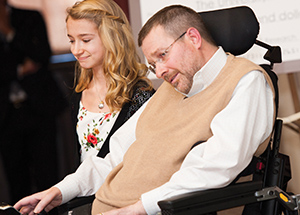Center Created to Research Treatments And Cure for Lou Gehrig’s Disease
The University of Pittsburgh has announced the creation of the Live Like Lou Center for ALS Research, and an O’Hara Township couple has pledged to raise half of the center’s initial funding.
Amyotrophic lateral sclerosis, or ALS, is a progressive, degenerative neurological condition, also known as Lou Gehrig’s Disease. There is no effective treatment for ALS, which causes progressive paralysis and eventually makes swallowing and breathing difficult, if not impossible, while sensation and cognitive function remain unaffected. Patients with ALS live two to five years after diagnosis, on average, with about 10 percent surviving for 10 years or longer.
Pitt’s center will focus on developing new treatments and, ultimately, a cure for ALS as well as on improving the quality of life for people who are now living with the condition.
 O’Hara Township couple Neil and Suzanne Alexander established a nonprofit, Live Like Lou, at the Pittsburgh Foundation in 2011, soon after Neil Alexander was diagnosed with ALS at age 46. They have pledged to raise $2.5 million for the center over five years and Pitt will match the contribution in an effort to raise $10 million for the new research center, which will be located in Pitt’s Brain Institute.
O’Hara Township couple Neil and Suzanne Alexander established a nonprofit, Live Like Lou, at the Pittsburgh Foundation in 2011, soon after Neil Alexander was diagnosed with ALS at age 46. They have pledged to raise $2.5 million for the center over five years and Pitt will match the contribution in an effort to raise $10 million for the new research center, which will be located in Pitt’s Brain Institute.
“We are honored to be chosen as partners in this effort by the Alexander family,” said University of Pittsburgh Chancellor Patrick Gallagher during a Feb. 5 announcement. “Their dedication to helping others with this debilitating disease is inspirational. We are looking forward to putting the resources and expertise of the University to work on this task, and we are honored that they have chosen the University of Pittsburgh as the site for this center.”
Neil Alexander said he is inspired by the dignity and perseverance shown decades ago by legendary Yankees first baseman Lou Gehrig, who died from ALS in 1941. A Hall of Famer for his work on the field, Gehrig is perhaps best remembered for his emotional farewell from baseball, because of ALS, at age 36. In his speech to a packed stadium, he told fans, “Today I consider myself the luckiest man on the face of this earth...I may have been given a bad break, but I have an awful lot to live for.”
“We call our effort Live Like Lou to honor the legacy Gehrig left for all of us who face this diagnosis,” said Neil Alexander. “We want to live with the same gratitude and grace despite the disease.”
Among the Live Like Lou Center’s early priorities are:
• Recruit an expert in the neurobiology of ALS
• Develop a non-human primate model of the disease
• Create a prototype of a “smart house” to test neuro-technologies and neuro-prostheses in a real-life home setting
• Explore brain-computer interface technology to foster patient independence
• Support clinical trials to slow or reverse the progression of ALS
• Award annual innovator grants to catalyze novel research approaches
Neil Alexander said he chose the Brain Institute to house the new research center because of Pitt’s accomplishments in neuroscience research and its translation of basic science into innovative solutions to clinical problems, exemplified by Jonas Salk’s polio vaccine. Pitt is where the gamma knife for minimally invasive brain surgery was introduced to neurosurgeons in North America, where Pittsburgh Compound B was developed for early detection of Alzheimer’s disease, and where a brain-computer interface first enabled a paralyzed woman to control a robotic arm by using her own thoughts to raise food to her lips.
“It is a great honor to have this opportunity to combine the University’s vast experience and resources in neuroscience with the Alexanders’ commitment and passion,” said Arthur S. Levine, Pitt’s Senior Vice Chancellor for the Health Sciences and John and Gertrude Petersen Dean of Medicine.
“The new center’s goals are bold,” said Peter L. Strick, Thomas Detre Professor and Chair of Neurobiology and scientific director of the Brain Institute. “We haven’t chosen easy targets. The Alexanders understand that we don’t have all the answers yet. Treatments and cures are going to come through basic research, and that is what our Brain Institute is designed for. But we also want to address the here and now and fund projects that will have a rapid payoff by improving the quality of life of ALS patients today.”
Neil Alexander said that while ALS seems to take something away from him every day, living with the disorder also has highlighted the unwavering love and support he has from friends and family, especially his wife and their young children, Abby and Patrick.
“We don’t think this work will help me necessarily,” he said. “But we want to do this for the next guy, the next father who starts to get a twitch in his left arm.”
Other Stories From This Issue
On the Freedom Road

Follow a group of Pitt students on the Returning to the Roots of Civil Rights bus tour, a nine-day, 2,300-mile journey crisscrossing five states.
Day 1: The Awakening
Day 2: Deep Impressions
Day 3: Music, Montgomery, and More
Day 4: Looking Back, Looking Forward
Day 5: Learning to Remember
Day 6: The Mountaintop
Day 7: Slavery and Beyond
Day 8: Lessons to Bring Home
Day 9: Final Lessons

